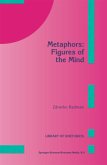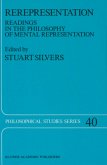This book deals with various aspects of metaphorics and yet it is not only, or perhaps not even primarily, about metaphor itself. Rather it is concerned with the argument from metaphor. In other words, it is about what I think we can learn from metaphor and the possible consequences of this lesson for a more adequate understanding, for instance, of our mental processes, the possibilities and limitations of our reasoning, the strictures of propositionality, the cognitive effect of fictional projections and so on. In this sense it is not, strictly speaking, a contribution to metaphorology; instead, it is an attempt to define the place of metaphor in the world of overall human intellectual activity, exemplary thematized here in the span that ranges from problems relating to the articulation of meanings up to general issues of creativity. Most of the aspects discussed, therefore, are examined not so much for the sake of gaining some new knowledge about metaphor (work conducted in the"science of metaphor" is presently so huge that an extra attempt to spell out another theory of metaphor may have an infiatory effect); the basic strategy of this book is to view metaphor within the complex of language usage and language competence, in human thought and action, and, finally, to see in what philosophically relevant way it improves our knowledge of ourselves. Certainly, by adopting this basic strategy we also simultaneously increase our knowledge of metaphors, of their functions and importance.
`Dr. Radman has presented in Metaphors: Figures of the Mind a clear, excellent account of how metaphor serves as a necessary cognitive key for all human intellectual activity. Radman properly embodies the mind exploring not only metaphorical accounts of mind, but also the metaphorizing, cognitive function of mind. He further examines the metaphorical claims of artificial intelligence and the use of Stephen Pepper's `root metaphors' or `key metaphors' as Radman calls them, to create worldviews. Radman draws on both contemporary accounts of metaphor and classical works. His text is rich with examples drawn from English and German writers. I highly recommend Radman's work for both readers familiar with the various controversies about metaphor and new readers unacquainted with this topic.'
Earl R. MacCormac, Consulting Professor of Radiology, Duke University Medical Center
`Most discussions of metaphor tacitly assume that literal meaning is direct, precise, and unproblematic, while metaphorical meaning is indirect, vague, and fraught with semantic and epistemological difficulties. Zdravko Radman's Metaphors: Figures of the Mind undercuts this complacent assumption. It shows that literal meaning is an achievement that results from a series of explorations, elaborations, projections and refinements, many of them metaphorical.'
Catherine Z. Elgin, Professor of Philosophy, Harvard University
`It is hardly an exaggeration to view the cognitive approach to metaphor as the emergence of a new paradigm: not only because the questions asked by the various scholars are now couched in radically different terms. For this reason, serious and well-informed syntheses are welcome, if one is to burrow one's way through the mountain of research and theories produced by `metaphormania' of the nineteen eighties. In Metaphors: Figures of the Mind, Radman offers such a status quaestionis, and in addition traces paths of thought, investigation and application which take the reader beyond the bounds of mainstream metaphorology.'
Jean-Pierre van Noppen, Professor of English Linguistics, Université Libre de Bruxelles
Earl R. MacCormac, Consulting Professor of Radiology, Duke University Medical Center
`Most discussions of metaphor tacitly assume that literal meaning is direct, precise, and unproblematic, while metaphorical meaning is indirect, vague, and fraught with semantic and epistemological difficulties. Zdravko Radman's Metaphors: Figures of the Mind undercuts this complacent assumption. It shows that literal meaning is an achievement that results from a series of explorations, elaborations, projections and refinements, many of them metaphorical.'
Catherine Z. Elgin, Professor of Philosophy, Harvard University
`It is hardly an exaggeration to view the cognitive approach to metaphor as the emergence of a new paradigm: not only because the questions asked by the various scholars are now couched in radically different terms. For this reason, serious and well-informed syntheses are welcome, if one is to burrow one's way through the mountain of research and theories produced by `metaphormania' of the nineteen eighties. In Metaphors: Figures of the Mind, Radman offers such a status quaestionis, and in addition traces paths of thought, investigation and application which take the reader beyond the bounds of mainstream metaphorology.'
Jean-Pierre van Noppen, Professor of English Linguistics, Université Libre de Bruxelles
`Dr. Radman has presented in Metaphors: Figures of the Mind a clear, excellent account of how metaphor serves as a necessary cognitive key for all human intellectual activity. Radman properly embodies the mind exploring not only metaphorical accounts of mind, but also the metaphorizing, cognitive function of mind. He further examines the metaphorical claims of artificial intelligence and the use of Stephen Pepper's `root metaphors' or `key metaphors' as Radman calls them, to create worldviews. Radman draws on both contemporary accounts of metaphor and classical works. His text is rich with examples drawn from English and German writers. I highly recommend Radman's work for both readers familiar with the various controversies about metaphor and new readers unacquainted with this topic.' Earl R. MacCormac, Consulting Professor of Radiology, Duke University Medical Center `Most discussions of metaphor tacitly assume that literal meaning is direct, precise, and unproblematic, while metaphorical meaning is indirect, vague, and fraught with semantic and epistemological difficulties. Zdravko Radman's Metaphors: Figures of the Mind undercuts this complacent assumption. It shows that literal meaning is an achievement that results from a series of explorations, elaborations, projections and refinements, many of them metaphorical.' Catherine Z. Elgin, Professor of Philosophy, Harvard University `It is hardly an exaggeration to view the cognitive approach to metaphor as the emergence of a new paradigm: not only because the questions asked by the various scholars are now couched in radically different terms. For this reason, serious and well-informed syntheses are welcome, if one is to burrow one's way through the mountain of research and theories produced by `metaphormania' of the nineteen eighties. In Metaphors: Figures of the Mind, Radman offers such a status quaestionis, and in addition traces paths of thought, investigation and application which take the reader beyond the bounds of mainstream metaphorology.' Jean-Pierre van Noppen, Professor of English Linguistics, Université Libre de Bruxelles








